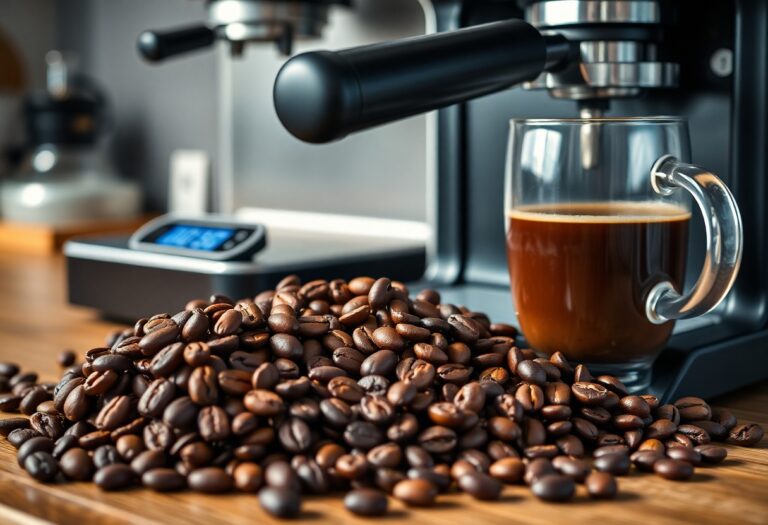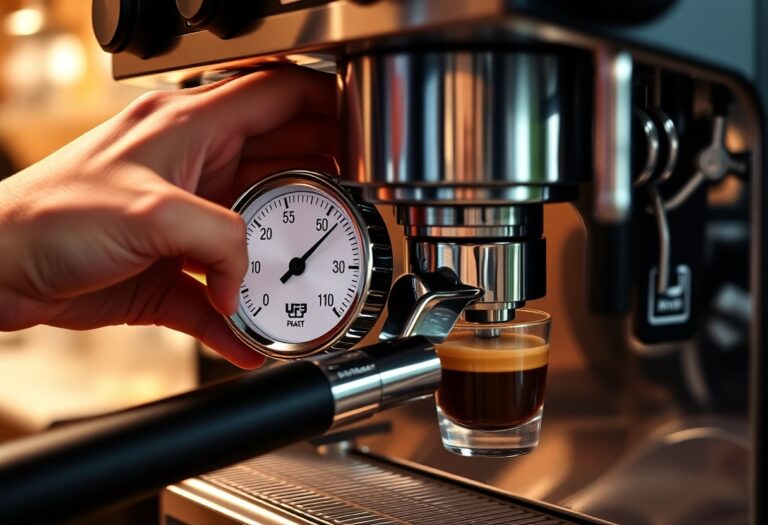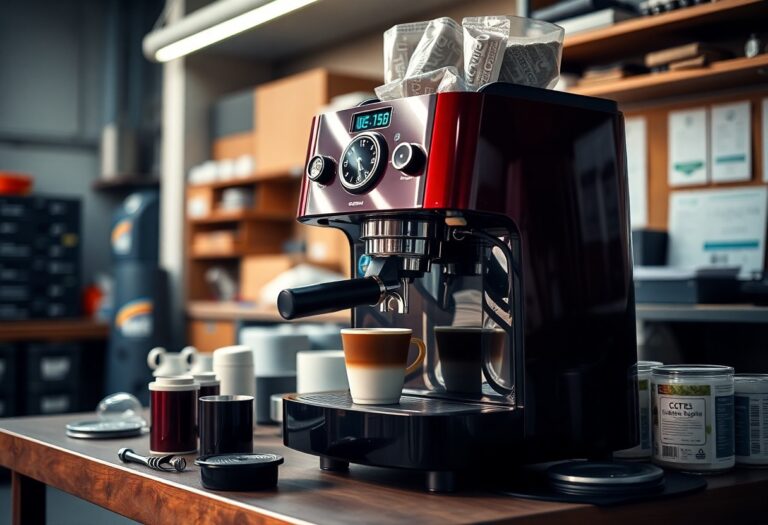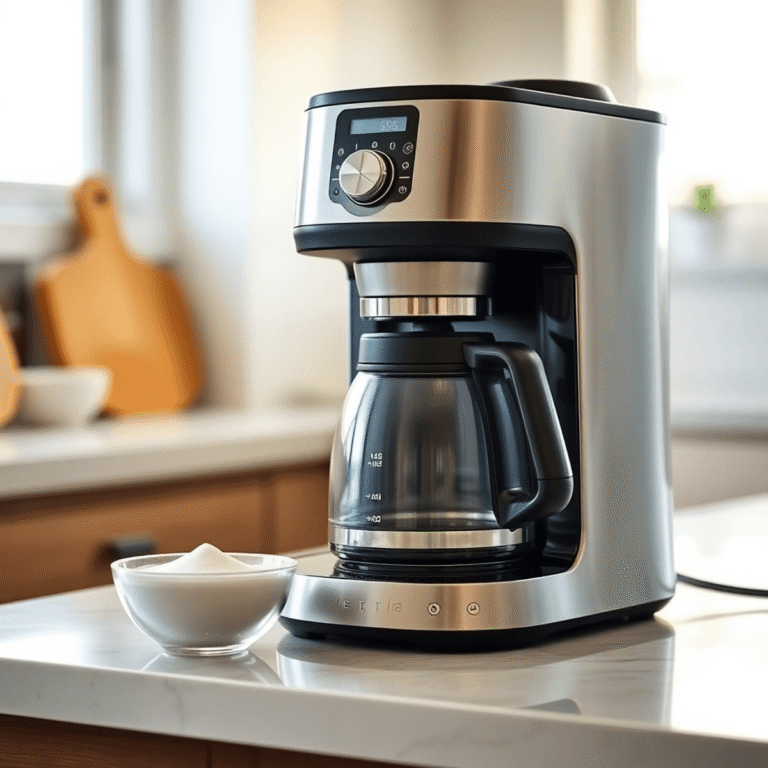What are Coffee Machine Cleaning Tablets Made Of – Tablet Composition
You may be surprised to learn that coffee machine cleaning tablets are specifically formulated to tackle tough stains and build-up in your brewing equipment. Typically composed of citric acid, tartaric acid, and surfactants, these ingredients work together to dissolve coffee oils and mineral deposits effectively. It’s imperative to use these tablets properly, as some formulations may contain harmful chemicals that can affect your coffee’s taste and safety if not used correctly. Understanding their composition helps you maintain optimal performance of your coffee machine while ensuring a delicious cup every time.
Key Takeaways:
- Coffee machine cleaning tablets are typically composed of a blend of citric acid, sodium carbonate, and phosphates, which work together to dissolve coffee oils and residues.
- Some tablets may also include surfactants to enhance cleaning efficiency and prevent buildup on internal components.
- Other additives might be present to help neutralize odors and improve the overall taste of brewed coffee after cleaning.
- The formulation of these tablets is designed to be safe for both home and commercial coffee machines while effectively maintaining performance.
- It’s important to choose cleaning tablets that are specifically formulated for your type of coffee machine to ensure optimal results and avoid damage.
The Chemical Backbone of Coffee Machine Cleaning Tablets
The formulation of coffee machine cleaning tablets is a balance of efficiency and safety, primarily centered around non-toxic materials that effectively tackle coffee residue. At their core, these tablets utilize compounds like citric acid, sodium carbonate, and phosphates, which serve as the backbone of their cleaning properties. The unique combination of these agents ensures that they dissolve easily in water, allowing them to penetrate and clean your coffee machine components effectively.
Key Active Ingredients in Cleaning Tablets
Key active ingredients in cleaning tablets include citric acid, renowned for its ability to break down mineral deposits, and sodium carbonate, which provides alkaline properties that enhance cleaning efficiency. Phosphates are also prevalent, working to soften water and prevent further buildup. Together, these ingredients create a powerful alliance against coffee oils and limescale accumulation.
The Role of Surfactants in Cleaning
Surfactants play a significant role in the effectiveness of coffee machine cleaning tablets. These compounds lower the surface tension of water, allowing it to spread more evenly across surfaces, ensuring that residues are loosened and lifted away effectively. Surfactants encapsulate grime, oil, and scale, preventing them from re-depositing on cleaned surfaces.
By utilizing surfactants, cleaning tablets enhance the overall cleaning experience by facilitating the removal of stubborn coffee oils that cling to components such as brew groups and water lines. It’s fascinating to note that these surfactants can effectively break down fatty acids found in coffee oils, ensuring that your brew area remains pristine. This deeper clean not only improves the taste of your coffee but also prolongs the lifespan of your machine, providing a tangible return on your cleaning efforts.

The Science Behind Efficacy: How Ingredients Interact
The combination of active ingredients in cleaning tablets is what drives their effectiveness. These components work synergistically, targeting mineral scale, oils, and coffee residues that accumulate in your machine. For instance, citric acid interacts with limescale deposits, while surfactants break down greasy residues, ensuring thorough cleaning. By understanding how these ingredients interact, you can appreciate why regular use of cleaning tablets is vital for optimal machine performance.
The Chemistry of Scaling and Residue Removal
Scaling occurs when minerals from water accumulate and harden within your coffee machine. Cleaning tablets often contain citric acid and tartaric acid, which effectively dissolve these mineral deposits. The efficacy of these acids hinges on their ability to disrupt the bonds that hold limescale together. As a result, regular use prevents buildup, ensuring your coffee machine operates efficiently.
The Importance of pH Balance in Cleaning
A balanced pH level is vital in ensuring the effectiveness of cleaning agents. Coffee machine cleaning tablets maintain an optimal pH level to enhance the solubility of minerals and facilitate residue removal. This careful balance ensures that active ingredients can work effectively without damaging the materials of your machine.
A pH level typically ranges from acidic to neutral is ideal for dissolving scale and breaking down stubborn coffee oils. For instance, a pH range between 1 and 4 is common in many cleaning products, which allows controlled efficacy in combating hard water deposits without causing harm to your machine’s components. Understanding the relationship between acidity and cleaning power will help you select the right product, ensuring that your coffee machine runs smoothly and delivers the taste you love.

Formulation Variations: What Sets Brands Apart
Brand variations in coffee machine cleaning tablets often stem from their unique formulations and proprietary blends. Some brands prioritize strong acidic components for heavy-duty cleaning, while others focus on gentle, biodegradable ingredients that promise to be safe for both your appliances and the environment. These differences can significantly influence cleaning effectiveness and compatibility with various coffee machine models.
Proprietary Blends and Unique Formulations
Many coffee cleaning tablet manufacturers develop proprietary blends that contain a mix of standard and exclusive ingredients. For instance, one brand may incorporate sodium percarbonate alongside citric acid to enhance oxygen release for better stain removal. These unique combinations can set brands apart, leading to marked differences in cleaning performance and user experience.
Natural vs. Synthetic Ingredient Preferences
Consumer preferences often dictate whether brands lean towards natural or synthetic ingredients in their formulations. Some users favor natural components, believing they are safer for both their machines and the environment, while others may opt for synthetics that promise more powerful cleaning capabilities.
Balancing natural and synthetic ingredients in coffee machine cleaning tablets can lead to diverse product offerings. Natural ingredients like citric acid and baking soda appeal to eco-conscious consumers, while synthetic agents, such as phosphates, are popular for their ability to tackle stubborn residue. Brands like Urnex emphasize plant-based formulas, while others may harness the cleaning power of aggressively formulated synthetics. Understanding your own preferences and the cleaning needs of your coffee machine will guide you to the most suitable option.
Analyzing Environmental Impact: Are They Eco-Friendly?
The environmental footprint of coffee machine cleaning tablets varies based on their composition and disposal. While some ingredients serve their cleaning purpose effectively, they may pose concerns if not managed properly. Manufacturers are increasingly aware of the need for sustainable practices. This awareness is driving innovations toward formulations that are less harmful and have a reduced impact on the environment during both use and disposal.
Biodegradability of Common Ingredients
Many of the common ingredients found in coffee machine cleaning tablets, such as citric acid and sodium carbonate, are inherently biodegradable. This means they break down into harmless substances over time, which can be safely absorbed by the environment. However, phosphates, while effective, can contribute to environmental issues like water eutrophication if they leach into waterways. Thus, choosing cleaning products with suitable compositions is vital for ensuring a minimal ecological footprint.
Regulatory Standards and Certifications
Regulatory standards and certifications play a significant role in determining the environmental impact of coffee machine cleaning tablets. Products that meet established guidelines by organizations such as the Environmental Protection Agency (EPA) are more likely to be formulated with eco-friendly practices in mind. These products often carry labels indicating compliance with stringent safety and environmental standards, ensuring that consumers can make informed choices about their cleaning supplies.
Adherence to regulatory standards not only reflects a commitment to reduced environmental impact but also fosters consumer trust. For instance, products marked with certifications such as Green Seal or EcoLogo indicate that they have passed rigorous environmental testing. These certifications assure you that the tablet’s formulation is less likely to contain harmful chemicals, which contributes to safer use in your kitchen, as well as better overall environmental practices. While examining cleaning options, look for these certifications to help guide your choices, ensuring you select products that align with your eco-conscious values.
Practical Application: How to Choose the Right Cleaning Tablet
Selecting the appropriate cleaning tablet for your coffee machine involves considering several factors including compatibility, ingredients, and specific usage instructions. Before purchasing, investigate the manufacturer’s recommendations for your machine model, as using the wrong tablet can lead to damage. You may want to explore Cleaning alternatives? : r/espresso for additional insights and user experiences. Always opt for high-quality tablets to ensure optimal cleaning performance.
Compatibility with Different Coffee Machine Types
Every coffee machine varies, thus cleaning tablet compatibility is a serious consideration. Tablets specifically designed for espresso machines may not work for drip coffee makers and vice versa. The following factors play a critical role:
| Machine Type | Recommended Tablet |
| Espresso Machines | Espresso-specific tablets |
| Drip Coffee Makers | Universal cleaning tablets |
| Single Serve Machines | Pod-compatible cleaners |
| French Press / Pour Over | Decalcifying agents |
This ensures your equipment remains functional and extends its lifespan. Thou shalt ensure the cleaning tablets match your coffee-making style closely to avoid complications.
Recommended Usage Guidelines for Optimal Results
Follow the manufacturer’s instructions located on the cleaning tablet packaging for usage guidelines. Ensure precise measurement and timing during the cleaning cycle. Overuse or incorrect application can lead to residue build-up, which may affect the taste of your coffee.
A successful cleaning routine involves not only proper usage but also regular maintenance. Aim to clean your machine after every 30 uses, or more frequently if you notice a difference in performance. Some tablets require a specific time to dissolve and work effectively, so be meticulous about timing and don’t rush the process. Additionally, rinsing your machine thoroughly post-cleaning is imperative to remove any leftover tablet residue, ensuring your next cup of joe tastes just right. Following these thorough guidelines can dramatically enhance your coffee experience and keep your machine in prime condition.
To wrap up
From above, you can see that coffee machine cleaning tablets are typically composed of a blend of citric acid, sodium bicarbonate, and other ingredients designed to tackle coffee residue and scale buildup. Understanding the composition helps you choose effective products for maintaining your machine’s performance. Ensuring proper cleaning not only enhances the flavor of your coffee but also extends the lifespan of your equipment, making it an crucial part of your coffee brewing routine.
FAQ
Q: What is the primary ingredient in coffee machine cleaning tablets?
A: The primary ingredient in most coffee machine cleaning tablets is citric acid. Citric acid is a natural organic acid that helps to break down mineral deposits, coffee oils, and other residues that accumulate in coffee machines over time.
Q: Do cleaning tablets contain any other active ingredients?
A: Yes, in addition to citric acid, cleaning tablets may also contain ingredients such as sodium carbonate and sodium bicarbonate. These compounds serve as alkaline agents that help enhance the cleaning process by neutralizing acids and breaking down stubborn residues.
Q: Are coffee machine cleaning tablets safe for all types of machines?
A: Most coffee machine cleaning tablets are formulated to be safe for use in various types of machines, including espresso and drip coffee makers. However, it’s important to check the manufacturer’s recommendations and the packaging instructions to ensure compatibility with your specific model.
Q: Can I use cleaning tablets for other appliances, like kettles or water dispensers?
A: While coffee machine cleaning tablets are designed specifically for coffee machines, some brands may also suggest using them for other appliances like kettles or water dispensers. However, always consult the manufacturer’s guidelines for those appliances to avoid potential damage.
Q: How do cleaning tablets contribute to the longevity of coffee machines?
A: Coffee machine cleaning tablets help maintain the machine’s internal components by effectively removing limescale and coffee oil buildup. Regular cleaning with these tablets can improve the performance of the machine, ensure better flavor extraction, and extend the overall lifespan of the appliance.







